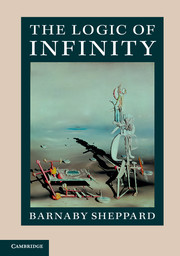Book contents
- Frontmatter
- Contents
- Preface
- Synopsis
- 1 Introduction
- 2 Logical foundations
- 3 Avoiding Russell's paradox
- 4 Further axioms
- 5 Relations and order
- 6 Ordinal numbers and the Axiom of Infinity
- 7 Infinite arithmetic
- 8 Cardinal numbers
- 9 The Axiom of Choice and the Continuum Hypothesis
- 10 Models
- 11 From Gödel to Cohen
- A Peano Arithmetic
- B Zermelo–Fraenkel set theory
- C Gödel's Incompleteness Theorems
- Bibliography
- Index
C - Gödel's Incompleteness Theorems
Published online by Cambridge University Press: 05 August 2014
- Frontmatter
- Contents
- Preface
- Synopsis
- 1 Introduction
- 2 Logical foundations
- 3 Avoiding Russell's paradox
- 4 Further axioms
- 5 Relations and order
- 6 Ordinal numbers and the Axiom of Infinity
- 7 Infinite arithmetic
- 8 Cardinal numbers
- 9 The Axiom of Choice and the Continuum Hypothesis
- 10 Models
- 11 From Gödel to Cohen
- A Peano Arithmetic
- B Zermelo–Fraenkel set theory
- C Gödel's Incompleteness Theorems
- Bibliography
- Index
Summary
Gödel's Incompleteness Theorems are now justly regarded both as one of the most profound discoveries in mathematical logic and as one of the gems of twentieth century mathematics.
Like all major scientific and mathematical landmarks (see also the Heisenberg Uncertainty Principle – in fact all of quantum mechanics – and the theory of complex dynamical systems (‘chaos’)), Gödel's theorems have captured the imagination of an excitable horde of pseudointellectuals who, not bothering to trouble themselves with actually studying the subject or understanding what the theorems say, instead abuse them, treating Gödel's deep and precise work as a springboard for flowery nonsense (generally hollow wordplay and embarrassingly vague analogies designed to obscure a chronic lack of content – a species of ‘mathematics envy’). For an account of how the Incompleteness Theorems have been misunderstood and mishandled see Torkel Franzen's Gödel's Incompleteness Theorem: an incomplete guide to its use and abuse. To fully appreciate Gödel's Theorems there is no better alternative than to carefully read a modern technical account which provides all the details. I recommend both Peter Smith's Gödel's Theorems and Raymond Smullyan's Gödel's Incompleteness Theorems. The latter is the main source for the condensed abstract sketch presented here.
Gödel's famous paper of 1931 begins by stating that large tracts of mathematics have become formalized, allowing proofs to be carried out by mechanical rules, the systems described by Russell and Whitehead's Principia Mathematica (PM) and Zermelo-Fraenkel set theory (ZF) being two notable and very far-ranging examples.
- Type
- Chapter
- Information
- The Logic of Infinity , pp. 419 - 428Publisher: Cambridge University PressPrint publication year: 2014



